M.J. Johnson's Blog, page 8
July 27, 2014
Wuthering Heights by Emily Brontë
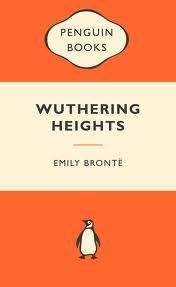 Wuthering Heights is another nineteenth-century literary classic that I had seen in adapted versions for film and TV but had never actually sat down to read. I am so glad that I finally got round to it, because this is one of the most extraordinary books I have ever read. Like her sister Charlotte’s equally great novel Jane Eyre, Wuthering Heights is without any shadow of doubt not only a literary classic but also a compulsive page-turner. The language is only very occasionally archaic and, like all the best writers, her vocabulary is accessible, so a dictionary is rarely if ever required to read this book. I am filled with nothing but awe and admiration.
Wuthering Heights is another nineteenth-century literary classic that I had seen in adapted versions for film and TV but had never actually sat down to read. I am so glad that I finally got round to it, because this is one of the most extraordinary books I have ever read. Like her sister Charlotte’s equally great novel Jane Eyre, Wuthering Heights is without any shadow of doubt not only a literary classic but also a compulsive page-turner. The language is only very occasionally archaic and, like all the best writers, her vocabulary is accessible, so a dictionary is rarely if ever required to read this book. I am filled with nothing but awe and admiration.The 1939 film with Laurence Olivier and Merle Oberon, directed by William Wyler, only really concentrates on the romantic relationship between Cathy and Heathcliff, and avoids getting involved with the book’s dark heart. Wuthering Heights is a powerful study of the destructive force of jealousy and bitterness. It is an incredible achievement, because Emily Brontë, through her main male character Heathcliff, manages to create a man/fiend who is at once both the book’s anti-hero and villain. He is a dark, brooding monster, slowly consumed by his own rancour, taking it upon himself to torture and destroy those who have wronged him. However, his thirst for revenge is never sated, and the reader is appalled by the scope of his hatred. Yet, tormented, vengeance-driven fiend though Heathcliff is, the quality and psychological depth of Brontë’s writing somehow always manages to keep a tiny part of the reader on his side. Something in us always yearns for him to find redemption.
Emily Brontë wrote Wuthering Heights under the pen name of Ellis Bell. It was published in 1847 - just a year before she died of tuberculosis. She was only thirty years of age at the time of her death, and never knew the success her one and only novel would go on to achieve. At first, it received quite mixed reviews - hardly surprising, I think, when you consider the book’s underlying sense of amorality, and the Victorian values it clearly challenges. Emily Bronte was born on 30 July (a day before my own birthday) - so she’d be a hundred and ninety-six this week (me, not so much!). I have no doubt people will still be reading and enjoying her novel in another two hundred years and more - and let’s face it, that’s more than can be said of just about every book that has ever won the Man Booker prize.
Happy birthday Emily Brontë. Thanks for writing such a monstrously brilliant novel!
Published on July 27, 2014 08:30
July 19, 2014
Thunder 'n' Lightning
 Great Aunt (Bopa) Mary's little chair There’s a right-angled cloud up in the sky looking down at me as I sit at my desk by the window in the corner of what used to be (and occasionally still is) our dining room. Right-angled clouds appearing in the sky, what next, I ask? Perhaps it’s there in the sky as a precursor to the mega-storm we’ve been warned to expect in the UK sometime this afternoon. The treetops are somewhat billowy and there are ominously dark clouds fast approaching - I’m on my guard! Judith instucted me to be off the computer before the storm strikes - good sense, of course, and I shan’t disobey her. Judith is not a fan of thunder and lightning. She is of course not alone in this: my Great Aunt Mary at the first thundrous drum roll would immediately gather her favourite little chair and head for the cupboard under the stairs; my father, generally a sanguine type, used to turn quite pale and become unusually silent during thunder storms. He’d seek out a quiet spot in a dark room and sit the thing out.
Great Aunt (Bopa) Mary's little chair There’s a right-angled cloud up in the sky looking down at me as I sit at my desk by the window in the corner of what used to be (and occasionally still is) our dining room. Right-angled clouds appearing in the sky, what next, I ask? Perhaps it’s there in the sky as a precursor to the mega-storm we’ve been warned to expect in the UK sometime this afternoon. The treetops are somewhat billowy and there are ominously dark clouds fast approaching - I’m on my guard! Judith instucted me to be off the computer before the storm strikes - good sense, of course, and I shan’t disobey her. Judith is not a fan of thunder and lightning. She is of course not alone in this: my Great Aunt Mary at the first thundrous drum roll would immediately gather her favourite little chair and head for the cupboard under the stairs; my father, generally a sanguine type, used to turn quite pale and become unusually silent during thunder storms. He’d seek out a quiet spot in a dark room and sit the thing out.Dad said he’d never been troubled by whatever the weather had thrown in his direction, until, in his early twenties, he’d experienced storms in the Himalayas. He was taken to Darjeeling to a nursing home to convalesce after first having undergone some weeks of hospitalisation and treatment for amoebic dysentery during World War Two. He was stationed on an RAF base in Mumbai (then Bombay), where he’d fallen prey to the ‘bug’. The treatment for this form of dysentery in those days required being filled-up with a pink foam that Dad said smelt like disinfectant. I shall spare you, gentle reader, a fuller description of exactly how a pink foam might wend its way along to find the small intestine of a British serviceman during WW2. Apparently, the treatment demanded that the foam had to be retained incrementally - initially for perhaps only fifteen minutes or so, gradually increasing to several hours. Dad always made me laugh when he described the joyous agony this experience could be at times. It’s not difficult to picture the scene - a ward full of bright-eyed young servicemen all attempting to retain the pink foam that had been inserted in their nether regions - the banter and waggish humour, and in the face of this, the Herculean effort required to avoid laughter and the bubbling gurgles that must inevitably follow any muscle relaxation.
Isn’t it strange where a right-angled cloud up in the sky can take you? Actually, in the time it’s taken to write this blog post the sky has totally cleared and it is now a gorgeous clear blue, not a storm cloud in sight - not even a pink bubble!
Published on July 19, 2014 09:39
July 13, 2014
Lil' Jimmy Reed
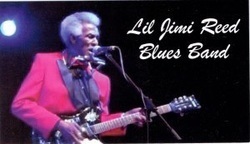 I’m still doing a fairly authentic troglodyte impression through my daily strivings down in the cellar. How much preparation can any flippin’ job require, I ask? Then in my head I hear the tempering voice of sound reason (I’ve learned to trust its promptings through many bitter lessons, dear reader) postulate, “Fail to prepare, prepare to fail”. I shrug my shoulders with resigned acceptance, gather together my board and trowel and carry on. Actually, I’m in danger of painting a picture of cellar purgatory here - it really ain’t that bad! And like I’ve said before, I quite enjoy, even relish, a burst of physical work between drafts. I like to move about and flex a muscle or two; the one and only thing I don’t like about writing is all the sitting down it requires, which makes me think that in the future I may research a standing desk.
I’m still doing a fairly authentic troglodyte impression through my daily strivings down in the cellar. How much preparation can any flippin’ job require, I ask? Then in my head I hear the tempering voice of sound reason (I’ve learned to trust its promptings through many bitter lessons, dear reader) postulate, “Fail to prepare, prepare to fail”. I shrug my shoulders with resigned acceptance, gather together my board and trowel and carry on. Actually, I’m in danger of painting a picture of cellar purgatory here - it really ain’t that bad! And like I’ve said before, I quite enjoy, even relish, a burst of physical work between drafts. I like to move about and flex a muscle or two; the one and only thing I don’t like about writing is all the sitting down it requires, which makes me think that in the future I may research a standing desk.Anyway, I did emerge from the cellar from time to time, most notably on Thursday evening when my son Tom, who with his encyclopaedic and ever-expanding knowledge of Blues, Jazz and Soul music, invited us to join him and his fiancee and go and see a touring Blues artist called ‘Lil’ Jimmy Reed’ that he’d heard of via the Blues with Bottle mailing-list. The gig was in nearby Sevenoaks at the Stag Theatre’s Plaza Suite venue, and was organised by the Blues with Bottle Club - a local group started some twenty years ago by a group of Blues enthusiasts. It’s a comfortable venue, the evening was relaxed but most importantly the music didn’t disappoint any!
At approximately seventy-five years of age Lil’ Jimmy Reed must be amongst the very last of the Southern Bluesmen who is still umbilically connected to its heyday. He was born in Louisiana, although I understand he now lives in Alabama. His first guitar was fashioned for him out of an old cigar box,and his first professionally made guitar was a gift from his father after he returned home after a successful day at work. He learned to play by ear and never took a lesson in his life. His real name is Leon Atkins and he acquired the name change after turning up to watch the popular blues singer Jimmy Reed; the management at the venue, seeing their man was too worse for wear with drink to put before an audience, and aware of Leon’s growing reputation, thrust him onto the stage, introducing him as Lil’ Jimmy Reed - the name stuck!
This was a terrific evening. Lil’ Jimmy was very ably supported by Bob Hall on boogie- woogie piano and Hilary Blythe on bass guitar. Judith and I were were very glad not to have missed this opportunity of experiencing Lil’ Jimmy play. We felt privileged to be hearing and seeing such an accomplished performer and great exponent of the Blues.
Here’s a clip of Lil’ Jimmy playing - taken from You Tube
Here’s Lil’ Jimmy’s Facebook page
Also, here are some up and coming UK dates. If any are near you - definitely worth seeing!
Published on July 13, 2014 05:56
July 6, 2014
Ghosts 'n' Stuff
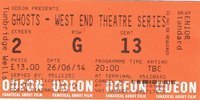 It’s been a busy week for us Johnsons
It’s been a busy week for us JohnsonsWe went to see a digitally recorded performance of the recent acclaimed Almeida Theatre production of Ibsen’s Ghosts, skilfully adapted and directed by Richard Eyre. It is a wonderful play about the power of the past to return and haunt the living with its unresolved bitter truths and hidden lies. An appropriate theme indeed at a time when so many loved and trusted British celebrities have been lately exposed for their sordid past behaviour.
In Ghosts, Ibsen, the great nineteenth-century exponent of naturalism, remains true to the unities of Greek Theatre (Action, Place, Time), as his play unfolds and its characters unravel within the space of a day and night. He was without any shadow of doubt a tremendous playwright, commanding an ability to drive his audience along with a force as irresistible as a steam locomotive. What may at first seem to be little more than a domestic drawing room saga, set in the comfortable provincial home of Helene Alving with her liberal ideals, soon has power to make the jaw drop. The past and its ‘sins’ return, leaving a trail of torment and destruction in their wake. Judging from the collective exhalation that came from the audience as the lights dimmed on the cinema screen - this play still packs a very powerful punch even a hundred and thirty years after it was written. The cast were all excellent, however, Lesley Manville was utterly marvellous as Helene Alving, and thoroughly deserved her Olivier award. I think her performance, its truthfulness, integrity and total lack of theatricality, has to rank as one of the very finest I have ever witnessed. Here’s a link to the West End Theatre Series website - some cinema performances are still available. Do not hesitate if it’s possible to see a reprise showing of this.
Judith and I spent last weekend in Cardiff. Since my mother passed away eighteen months ago now, we like to pay a visit home every few months when the feeling of ‘hiraeth’ (longing is closest to the word’s meaning) becomes compelling. “We loves the ‘Diff!” We met up for coffee with a long-lost cousin, last seen when he was thirteen and I was eleven. We’re all chatterboxes and a couple of strong coffees didn’t inhibit any of our tongues any. We had a lovely time!
Then I returned home to the cellar and the great effort I’m engaged in down there. I love a difficult task, although after our busy weekend I did feel rather despondent by Tuesday after realising I had made a mistake the previous day and needed to take another day to undo everything it had achieved. Ah well, I got over it and was smiling again by the end of the week - especially after receiving, completely out of the blue, no less than four new 5* reviews for Roadrage in as many days! All were, as always, greatly appreciated - two of these pieces were so marvellously succinct I hope you’ll forgive my indulgence by including them in this blog post:
“I found this book by chance and it is a riveting read. Fantastic characters, fantastic plot and I would highly recommend to all. Brilliant.” - left on Amazon UK
and
“Brilliant storyline. A must read.” - left on Goodreads
Pretty good, huh?
Published on July 06, 2014 09:16
June 27, 2014
Call of the Wild and White Fang by Jack London
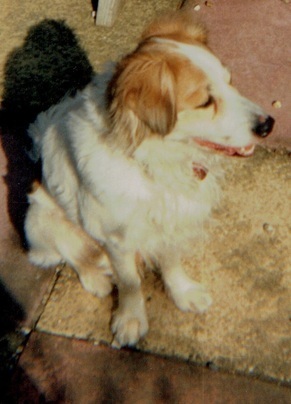 Bob our old dog (not to be confused with White Fang!) I recall very little about the novel White Fang by Jack London, other than it being a very famous story about a wolf-dog, and that I was introduced to it around the age of eleven or twelve in Gilbert Bennett’s English class at Gowerton Boys’ Grammar School. I also suspect that the version we were presented with and read in class may have been abridged for schools. My wife had a copy of the book on her Kindle - don’t know why, maybe intending to read it herself? Anyway, she wasn’t planning to use the aforementioned device herself for a bit, as she was deeply engrossed in some particularly thick and worthy looking papery tome, so I thought I’d keep its pages turning (metaphorically speaking!).
Bob our old dog (not to be confused with White Fang!) I recall very little about the novel White Fang by Jack London, other than it being a very famous story about a wolf-dog, and that I was introduced to it around the age of eleven or twelve in Gilbert Bennett’s English class at Gowerton Boys’ Grammar School. I also suspect that the version we were presented with and read in class may have been abridged for schools. My wife had a copy of the book on her Kindle - don’t know why, maybe intending to read it herself? Anyway, she wasn’t planning to use the aforementioned device herself for a bit, as she was deeply engrossed in some particularly thick and worthy looking papery tome, so I thought I’d keep its pages turning (metaphorically speaking!).Jack London was born John Griffith Chaney in 1876 and became a hugely successful American writer of fiction within his fairly short lifetime. I had absolutely no idea just how prolific he really was. He wrote about twenty novels, the most famous of these being The Call of the Wild, White Fang, The Sea Wolf and Martin Eden. He also wrote a great many short stories, and many critics consider this form to be where his real talent as a writer lay. I can’t comment on these because I haven’t read any of the short stories. All I can say is that if this is so, and if White Fang and Call of the Wild are anything to go by, then they must be pretty splendid.
I’d completed White Fang (1906) before I started Call of the Wild (1903) - I didn’t check their chronology. Another thing I didn’t know is that Call of the Wild is considered his great masterpiece, and I can probably appreciate this; it is in some ways tighter and leaves the reader with a more haunting sense of ‘the wild’ that we have all evolved from. Both novels still make an impact on the reader even after just over a hundred years. In fact the only thing that dates either book is an occasional archaic word or phrase. London in both books manages to give the reader an insight into the instincts and thoughts that drive his animal lead characters without ever descending into any toe-curling anthropomorphism e.g. (to be spoken in cute children’s voices):
White Fang: Hi there. What are you?
Fluffy: (coyly) I’m a rabbit. What kind of animal are you?
White Fang: I’m a wolf. My name’s ‘White Fang’. What’s yours?
Fluffy: (A little more confidently) They call me ‘fluffy’.
White Fang: (giggles) That’s a funny name. Would you like to be friends, Fluffy?
Fluffy: More than anything in the World.
They are both equally page-turners. The books are like mirrored reflections and in this way complement each other; I can only imagine that this was London’s aim. Call of the Wild follows its canine main character Butch from his life of domesticated ease in North America through his abduction to the wilds of Alaska, suffering deprivation, human cruelty but some kindness too, up to the book’s conclusion when the ‘wildness’ in his being comes to the fore. The books speak to those instinctual voices buried deep in our genetic heritage, that are triggered and flicker to life at certain moments: when confronted by the sheer majesty of a virgin landscape untouched by man; the sight of a bird of prey in flight; the grace, agility and almost invisible stillness of wild creatures accidentally observed.
White Fang, the titular hero of the later book, takes an opposing but parallel path to Butch in Call of the Wild. White Fang is a wolf-dog, raised amongst wolves and slowly domesticated. He is brutalised by the human masters he encounters, and because of his wolf pedigree is despised and attacked by the huskies amongst which he is forced to live. He has become completely isolated, a savage loner by the time he is shown kindness for the first time by Weedon Scott. White Fang becomes entirely devoted to Scott and he refuses to be parted from him even when his master returns home to California from the Yukon. I suppose the ending might be considered by some to be a little sentimental and contrived; I found it perfectly agreeable and very satisfying, but then, I’ve never had much affection for the post-modern style ending.
These remain great books and thoroughly deserve their classic status.
Published on June 27, 2014 09:10
June 22, 2014
The Complete Maus
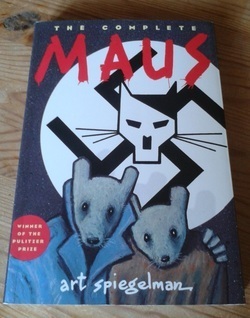 Occasionally, but very occasionally, a piece of literature or a work of art pops up that grabs you by the ruff and shakes you up. It sends a shiver down the spine and sets off an echo that goes on reverberating through the depths of your being. It’s the kind of response that sadly seems to occur less frequently as one grows older, possibly because our field of vision has broadened; at least I hope this is the case and it isn’t simply because we’ve become jaded by years of exposure to all the various stimuli that constantly bombard us! I’m not talking about the current swift-hit flavour-of-the-month - the must-see book, play, film or exhibition that five years on is barely recollected. Anyway, all I really know is what pure joy it is when you discover a piece of work that can still stun you in this way, that has power to alter your perception of place and time, make you reassess something you believed was understood and assimilated long ago.
Occasionally, but very occasionally, a piece of literature or a work of art pops up that grabs you by the ruff and shakes you up. It sends a shiver down the spine and sets off an echo that goes on reverberating through the depths of your being. It’s the kind of response that sadly seems to occur less frequently as one grows older, possibly because our field of vision has broadened; at least I hope this is the case and it isn’t simply because we’ve become jaded by years of exposure to all the various stimuli that constantly bombard us! I’m not talking about the current swift-hit flavour-of-the-month - the must-see book, play, film or exhibition that five years on is barely recollected. Anyway, all I really know is what pure joy it is when you discover a piece of work that can still stun you in this way, that has power to alter your perception of place and time, make you reassess something you believed was understood and assimilated long ago.For me The Complete Maus by Art Spiegelman was just such an experience. It traces Spiegelman’s own parents’early lives in Poland and their journey through the Holocaust. It won the Pulitzer Prize back in 1992 - becoming the first graphic novel ever to do so - in my view an accolade very well deserved. Spiegelman depicts his comic-book cast as animals: Jewish people are mice, Germans are cats, Poles are pigs, Americans are dogs, Swedes are reindeer. By impersonalising the characters in this way and with a deceptively simple drawing style, Spiegelman in Maus manages to achieve something utterly remarkable, he makes us look at and see again stuff that most of us will have encountered with open-mouthed horror many times before, but in a totally new way. It becomes one of the most powerful personal testimonies I have ever read, as he, Spiegelman, interviews his not always endearing father in Rego Park, New York for his planned account of the Holocaust. We understand something of Spiegelman junior’s guilt about his mother’s suicide in 1968 shortly after he’d experienced a nervous breakdown, and the lifelong angst he felt about the death of a brother he never knew - at one point in Maus he starts drawing himself as a man hiding behind a mouse mask. He very cleverly conveys to the reader the extremely long-cast shadows of Auschwitz and Dachau, and the power of these camps to go on souring the lives of those who not only survived their inhuman cruelty, but were not yet even born.
I would simply run out of superlatives explaining this book’s worth.
Published on June 22, 2014 03:53
June 14, 2014
Father's Day
 Tomorrow is Father’s Day in the UK, and I’m fortunate enough to have a son who has planned something for us all to celebrate the occasion. My own father died prematurely almost nineteen years ago because of a very bad medical diagnosis. It was a tragic end to a worthwhile life and my family and I have greatly missed having him around all these years. He’d be ninety-two if he was still with us.
Tomorrow is Father’s Day in the UK, and I’m fortunate enough to have a son who has planned something for us all to celebrate the occasion. My own father died prematurely almost nineteen years ago because of a very bad medical diagnosis. It was a tragic end to a worthwhile life and my family and I have greatly missed having him around all these years. He’d be ninety-two if he was still with us.As explained here before, I’ve formatted both my books ready for their various e-book versions and print editions. And I have to admit, although I certainly enjoy reading on Kindle, nothing beats the buzz of leafing through your own printed book if you’re satisfied with the outcome. When the shipment of books arrives, I invariably think of Dad. I always think of him too when I’m formatting, because apart from the years robbed from him and his generation by Adolf Hitler and his megalomaniac pals, he remained a printer all his working life. He did a seven year apprenticeship from the age of fourteen. He once told me how on the fresh-faced first day of his working life he’d been sent out by the experienced men of his printing office to a local chemist shop for a pot of ‘elbow grease’. The chemist had chuckled when he’d placed his order and gently informed him, “They’re pulling your leg, boy.”
Dad loved his job and was highly skilled at it. He was bi-lingual and used to set books in Welsh and English on a Monotype machine. For the technical know-how, justifying of text, kerning etc that we now rely on computers to organise and beautifully arrange for us, Dad had nothing else to depend on but skill and experience. He was however no Luddite, and I can easily imagine he’d be fascinated and impressed by the kind of technology that makes the abilities he’d acquired over years being available to his son by utilising a very straightforward piece of software. I think the digital revolution would have found my Dad thoroughly mesmerised. When you think of it, the actual idea behind printing, basically using reversed lead letters to make an imprint on a piece of paper, was pretty much the same in Dad’s day as it had been at the time of William Caxton.
So, it’s Father’s Day tomorrow. I’ll be thinking of you Dad.
Published on June 14, 2014 12:27
June 7, 2014
Jane Eyre
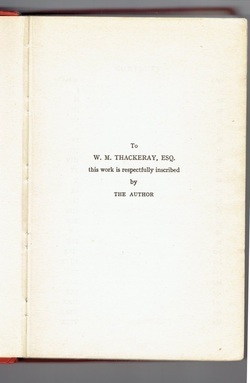 The author's dedication to W M Thackeray I’ve been reading Jane Eyre on my wife’s Kindle (don’t possess one myself). I’ve seen so many adaptations of the novel over the years but had never actually read the words on the page. Perhaps this was partly the result of the segregated system of education I experienced at a boys’ grammar school. I recall reading no female writers whatever, whereas my wife, at a girls’ grammar school, was at the very same time reading the Bronte sisters, George Elliot, Jane Austen etc.
The author's dedication to W M Thackeray I’ve been reading Jane Eyre on my wife’s Kindle (don’t possess one myself). I’ve seen so many adaptations of the novel over the years but had never actually read the words on the page. Perhaps this was partly the result of the segregated system of education I experienced at a boys’ grammar school. I recall reading no female writers whatever, whereas my wife, at a girls’ grammar school, was at the very same time reading the Bronte sisters, George Elliot, Jane Austen etc.For my pennyworth, Jane Eyre undeniably deserves its accolade of classic. A hundred and sixty-seven years after publication it remains a page turner - and I knew the story too! The book certainly caused this reader to get a telling off from his life partner for reading too late, and several times I was caught reading shortly after waking and before breakfast. Jane Eyre remains one of the nation’s favourite books; it is still widely read, a state of play I can’t imagine altering for many decades to come. In 2003 it came tenth in the BBCs national poll The Big Read - pretty impressive when you consider the breadth of English literature.
The book is narrated in the first person and the story follows the life of its titular main character from early childhood through to maturity. The novel incorporates many romantic and Gothic themes and has an erotic element that must have brought more than a little heat to the cheeks and caused a fair number of sighs amongst its Victorian readers. Its strong-minded heroine possesses and develops her own moral code throughout the book and does not readily bow to either convention or dogma. She rejects the Christian hypocrisy of Reverend Brocklehurst, the icy cold Christian asceticism and search for martyrdom of St John Rivers, and until he has atoned and been purged of his former ‘sins’, resists and rejects the physical love promised by the Byronesque character of Edward Rochester.
This novel was revolutionary when it first hit the bookshelves back in 1847. I’m sure there are many people who might choose to linger and labour over its plot deficiencies and failings, but this isn’t for me. I have never understood why those who discover only pain and misery between the pages of a book, still resolutely and doggedly pursue reading it all the way to the bitter end - then award it one star - what is this, revenge? The book most certainly has some flaws, yet for all this, it is still great reading.
I think I’m going to spend the next few months catching up on a few more of the literary classics I’ve so far missed out on reading in my journey along life’s highways and byways. A daily dose of first division literature seems to be just the ticket and complements very well the physical work I’m engaged in at the moment. Incidentally, reading this text on the Kindle device was definitely a pleasurable experience, because often these English classics come in books containing very small print. I am now officially a fan of e-readers!
Published on June 07, 2014 05:15
June 1, 2014
Old Chums and Great Passions
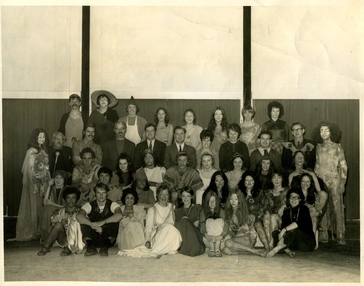 A Midsummer Night's Dream (Nov 1970) - Ogmore-by-the-Sea The wife’s gone off to London for the day (Saturday). She just rang - she’s having a coffee with Bob Mason , an old chum of mine from my teenage years in Wales (see photo left of the Glamorgan Schools' Theatre Company production of A Midsummer’s Night’s Dream - Bob played Bottom and is photographed with donkey ears, end of third row on right - that’s me seated on end of second row left). We met up again in London about a decade later, around the time my son was born; my wife got to know him then too. Unbeknown to either of us, we’d both trained as actors at different schools in London. We saw a lot of him for a while and then he disappeared from our lives again until about three years back - he tracked me down through my website. He rang yesterday to say he was on a flying visit from Sweden and were we around to meet up? I wasn’t able to get up to London myself today as I had a pre-arranged appointment this afternoon with someone who is going to be doing some work for us. Judith however was actually visiting London today to see her lifelong hero Julie Andrews, who’s appearing on stage at the Hammersmith Apollo. Sadly, she no longer sings of course, but I think she tells anecdotes and is interviewed by Aled Jones. What’s for certain is that Judith will love it! And when I imagine the audience of two thousand odd adoring fans and think of my wife’s rapturous expression surrounded by all those like minded ‘brothers and sisters’, without being in any way snide, somehow I can’t help smiling.
A Midsummer Night's Dream (Nov 1970) - Ogmore-by-the-Sea The wife’s gone off to London for the day (Saturday). She just rang - she’s having a coffee with Bob Mason , an old chum of mine from my teenage years in Wales (see photo left of the Glamorgan Schools' Theatre Company production of A Midsummer’s Night’s Dream - Bob played Bottom and is photographed with donkey ears, end of third row on right - that’s me seated on end of second row left). We met up again in London about a decade later, around the time my son was born; my wife got to know him then too. Unbeknown to either of us, we’d both trained as actors at different schools in London. We saw a lot of him for a while and then he disappeared from our lives again until about three years back - he tracked me down through my website. He rang yesterday to say he was on a flying visit from Sweden and were we around to meet up? I wasn’t able to get up to London myself today as I had a pre-arranged appointment this afternoon with someone who is going to be doing some work for us. Judith however was actually visiting London today to see her lifelong hero Julie Andrews, who’s appearing on stage at the Hammersmith Apollo. Sadly, she no longer sings of course, but I think she tells anecdotes and is interviewed by Aled Jones. What’s for certain is that Judith will love it! And when I imagine the audience of two thousand odd adoring fans and think of my wife’s rapturous expression surrounded by all those like minded ‘brothers and sisters’, without being in any way snide, somehow I can’t help smiling.We should all have at least one thing in this life that we really adore!
Judith and I consider ourselves extremely blessed because we’re enthusiastic about literally dozens of things. Reading is of course a shared lifelong passion. I’m currently reading Jane Eyre, which I’m almost ashamed to say I’d never picked up before, although I have seen numerous adaptations. When I was a boy the BBC took its remit to educate its audience very seriously, and every Sunday afternoon we were introduced to the Classics through various serialisations - I suspect Jane Eyre was first experienced in this way. I know the characters and story in the book very well, so unfortunately there are no great surprises as there might have been, however it is still a great book and remains after more than a hundred and fifty years a total page-turner.
On the subject of books: I am really pleased that lots of people have taken advantage of the ‘Pre-Summer Madness’ low-price promo for Niedermayer & Hart and Roadrage on Amazon Kindle and Smashwords (if reading on my website, full details in the column to the right of this blog post). I plan to allow this offer (especially as it’s not officially summer yet!) to run for a little while longer before putting the price up again. Thanks very much to everyone who has posted a review - this is an invaluable promotional tool and always greatly appreciated.
Enjoy your week!
Published on June 01, 2014 01:33
May 24, 2014
The Curious Incident of the Dog in the Night-Time
 The title The Curious Incident of the Dog in the Night-Time chosen by Mark Haddon for his hugely successful novel comes from a remark made by Sherlock Holmes to his trusty pal Watson in the story Silver Blaze. Haddon’s novel is about a fifteen year old autistic boy who takes it upon himself to solve the mystery of who murdered a neighbour’s dog. I enjoyed the book immensely at the time I read it, as did a couple of million other readers - but I can’t honestly say I raved about the novel - I just gave it a strong ‘like’. However, I absolutely loved the National Theatre production which we watched on Thursday evening at our local cinema in its NTLive strand! The show, adapted with skill and sensitivity from the Haddon book by Simon Stephens, was truly exceptional. And watching theatre of this calibre made me definitely wish I’d seen it performed live at the National. This is the one real drawback of pre-recorded or even live-screened theatre, you never quite experience that intimacy, the tangible thrill you get from actually being there - close to the actors and action. At the end of the screening, there is inevitably a certain sense of disconnection, especially on occasions like the performance we watched when the cast were given a standing ovation - you are a voyeur rather than an active participant. But I’m not complaining, it is great to see such stupendous work, even if one-step removed from it.
The title The Curious Incident of the Dog in the Night-Time chosen by Mark Haddon for his hugely successful novel comes from a remark made by Sherlock Holmes to his trusty pal Watson in the story Silver Blaze. Haddon’s novel is about a fifteen year old autistic boy who takes it upon himself to solve the mystery of who murdered a neighbour’s dog. I enjoyed the book immensely at the time I read it, as did a couple of million other readers - but I can’t honestly say I raved about the novel - I just gave it a strong ‘like’. However, I absolutely loved the National Theatre production which we watched on Thursday evening at our local cinema in its NTLive strand! The show, adapted with skill and sensitivity from the Haddon book by Simon Stephens, was truly exceptional. And watching theatre of this calibre made me definitely wish I’d seen it performed live at the National. This is the one real drawback of pre-recorded or even live-screened theatre, you never quite experience that intimacy, the tangible thrill you get from actually being there - close to the actors and action. At the end of the screening, there is inevitably a certain sense of disconnection, especially on occasions like the performance we watched when the cast were given a standing ovation - you are a voyeur rather than an active participant. But I’m not complaining, it is great to see such stupendous work, even if one-step removed from it.Everything about this production, staged in the round and directed by Marianne Elliott, deserves praise: design, lighting, movement, sound, and of course the excellent ensemble acting. Being presented in the round, it has little physical set to speak of, but believe me it really works; you will most certainly feel sympathy for the play’s fifteen year old hero as he makes his way across London, goes up escalators for the first time, is forced to enter crowded commuter trains, and you will definitely fear for his life when a tube train hurtles towards him! This really is a piece of magical theatre and deserves the praise already heaped in large quantities upon it. It was nominated in eight categories at last year’s Olivier awards and actually won in seven, including the coveted Best Actor award for its leading actor Luke Treadaway and Best New Play. This NTLive encore screening is still doing the rounds throughout May/June; the play resumes in London in June, after rain damage to the theatre forced it to close suddenly; it starts its Broadway run in September; also, a UK and Ireland tour in December.
Definitely one to catch!
Published on May 24, 2014 02:57



